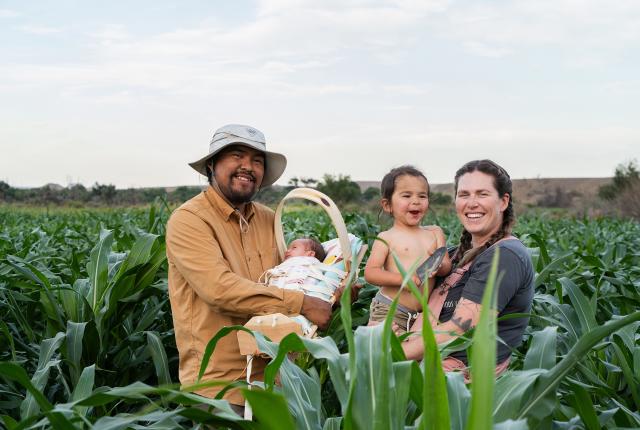AFTER THE BIRTH OF THEIR SON, Yabiito Yehoshzho, in 2021, Zachariah and Mary Ben became frustrated with the lack of fresh baby food at area grocery stores. So Zachariah, a sixth-generation Diné farmer, and his wife, Mary, a first-generation Hungarian American with experience in public health, started growing their own traditional foods—Navajo corn, amaranth, squash, beans, and melons. With Zachariah’s background in permaculture and traditional farming, the couple coaxed crops from his grandmother’s farm and turned them into dehydrated white-corn-based baby cereals. Little Yabiito Yehoshzho, whose name means “Water from the sky, the ground is softened with,” savored the fruits of his parents’ labor so much that the Bens launched Bidii Baby Foods to provide Indigenous children with nutritious ancestral food and reconnect families with the relationship between nurturing children and nurturing the land. Bidii Baby Foods has already fed thousands of children, mostly in New Mexico, through school programs and other organizations providing food to young children.
BIDII BABY FOODS STARTED when my wife and I first saw that we were pregnant and realized that our lives were no longer about ourselves. It’s about this child that we’re growing. This child needs to eat.
THIS WAS DURING THE PANDEMIC, and we saw that the shelves were running low. We knew that Gerber and other processed baby foods contain heavy metals. We thought, What can we do to move away from a dependence on processed food, especially now that it’s been so industrialized?
WE THOUGHT ABOUT OUR OWN FOODS as Navajos, our Navajo corn. So we started to grow these foods on our own.
COME HARVEST SEASON, we’ll harvest the corn and haul it to underground pits that are four feet wide by 10 feet deep, where it’s steamed for 12 hours, then dehydrated on drying racks for a week. We do 30 truckloads a year.
BIDII BABY FOODS MAKES ABOUT TWO AND A HALF TONS of product a year. We sold out this season because our primary focus is on early childhood development and nutrition through preschools, day-care centers, and school districts within New Mexico.
WE IMPACTED 19,500 CHILDREN in the 2023 season, doubling the number from the 2022 season. That makes me feel like I’m supported, like I’m on the right track.
WE STARTED THE FARMER-IN-REZIDENCE program with two Indigenous farmers last year, thanks to a grant that Save the Children provided. Not only do we teach them about farming practices, we teach them about entrepreneurship.
WE WORK WITH HERITAGE SEEDS that are passed along from generation to generation.
WE DONATE 20 PERCENT OF OUR SEEDS back to Native Seeds/SEARCH [an heirloom seed conservation center], in Tucson, Arizona, so we can share info about how those seeds have been cared for.
EVERYBODY’S USED TO THE THREE SISTERS. In Navajo culture, we have the Four Sisters—corn, squash, beans, and tobacco.
WE GET TOBACCO from Native Seeds/SEARCH that we plant for ceremonial purposes and as a natural herbicide.
THROUGH INDUSTRIALIZATION, we’ve separated ourselves from nature.
WITH BIDII BABY FOODS, we’re reconnecting everybody to the traditional farming method of not having to work with pesticides. To be able to share that with our communities, we’re able to grow into a healthier future.
WE FOUND OUT WE WERE PREGNANT AGAIN and our due date was harvest time last year, in July. Our daughter was born in a yellow-corn field on one of the hottest days in the year, at 110 degrees. A huge shout-out to the Diné Doula Collective, who helped.
WE NAMED HER NADAALTSUII YIDEHAYA, which means “Daughter of yellow corn, she emerged.”


